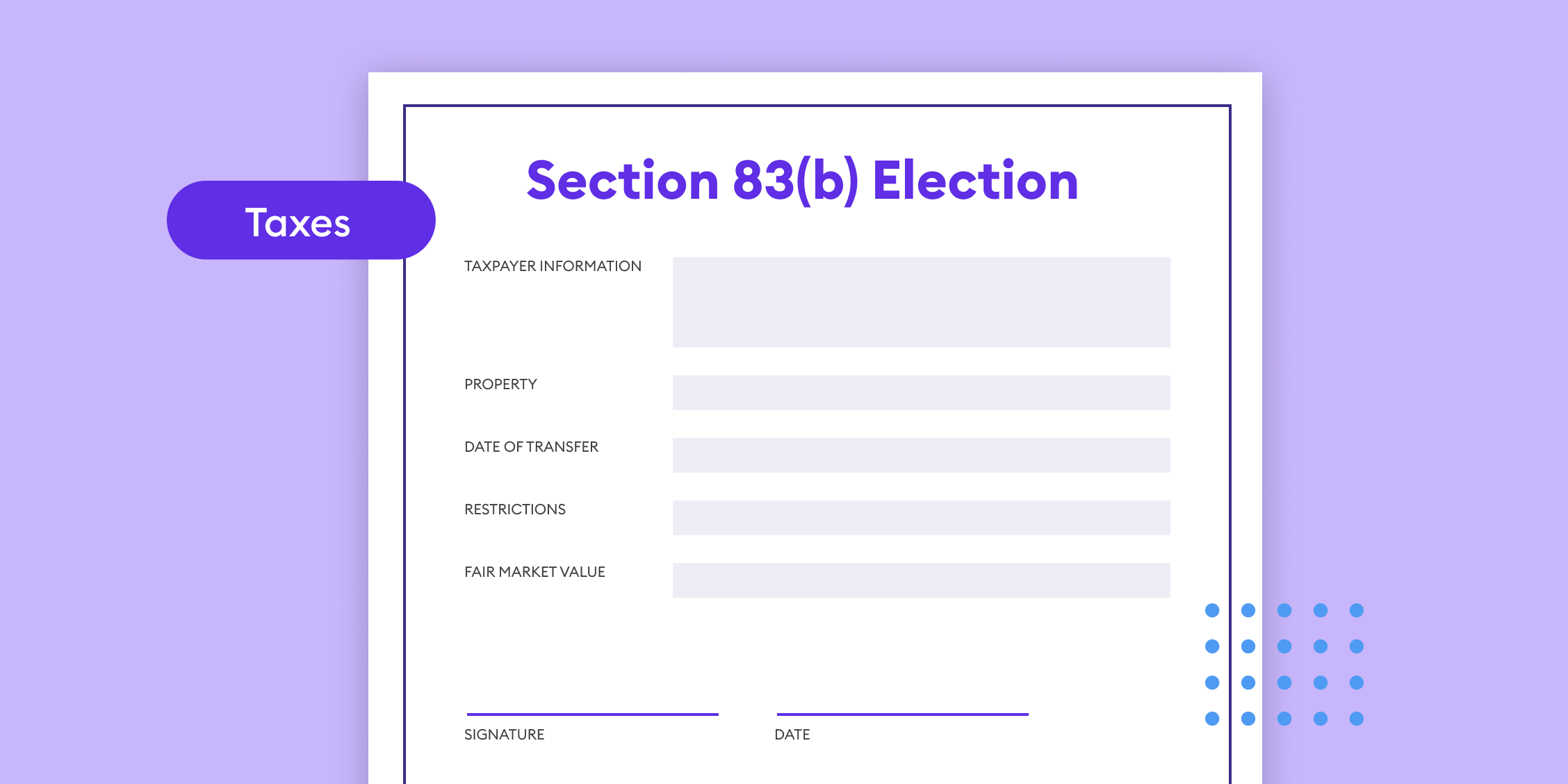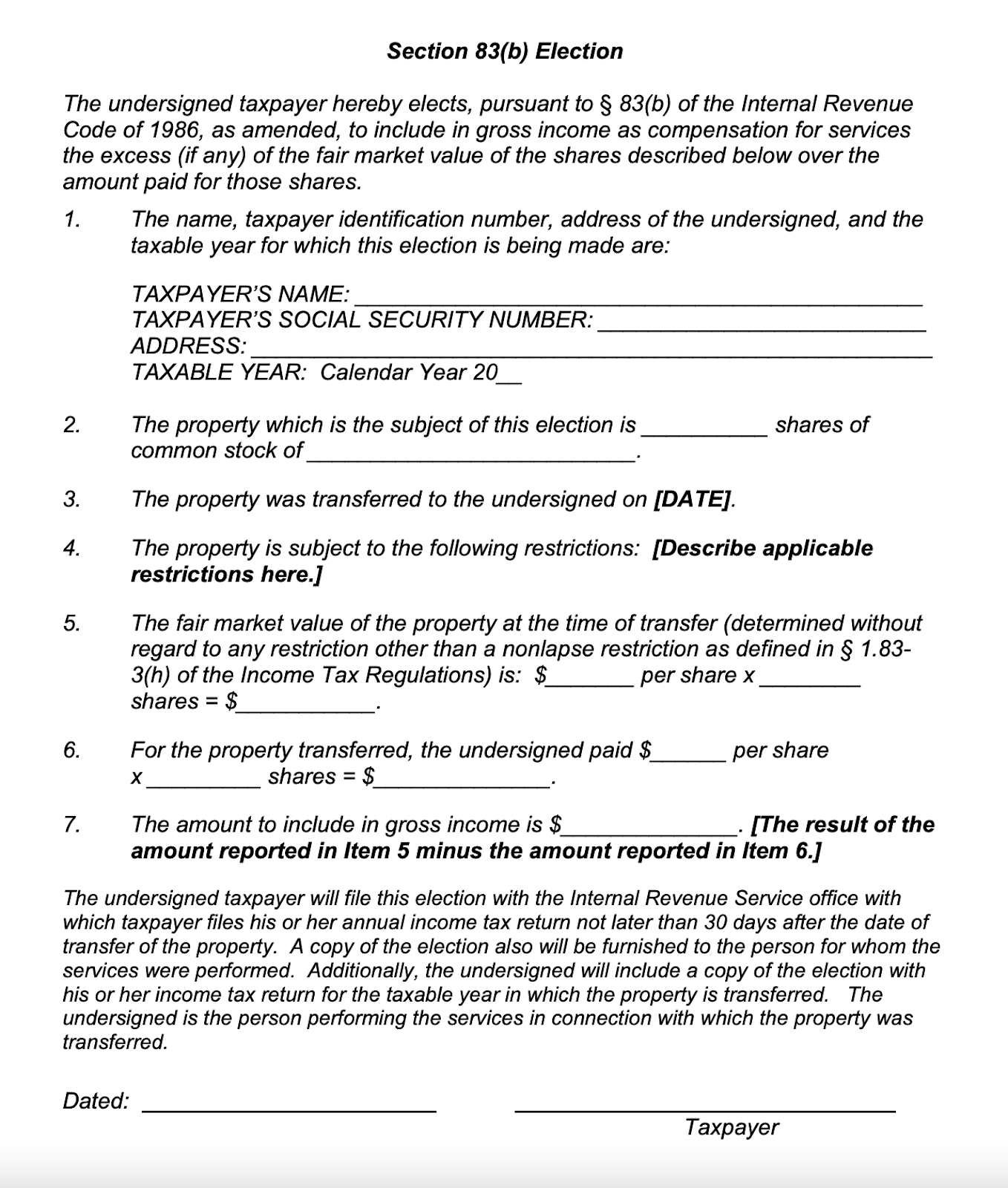What Are the Benefits of an 83b Election?
A confirmation email has been sent to your email.

As a founder, you want people to be invested in your startup’s long-term success.
Offering equity stakes in your company can help you attract investors and employees who want to see it—as well as the value of their shares—grow over time.
On the flip side, receiving equity as a founder should also motivate you to get your company off the ground and on the right track.
Whenever shares are granted, you and anyone else who receives it must make an important decision: pay taxes on these assets upfront by filing an 83(b) election or bite the bullet later when shares vest.
Although either option has its fair share of potential benefits and drawbacks, determining whether or not you should make an 83(b) election isn’t exactly a clear-cut decision, especially if you don’t know when it may be advantageous to exercise the option.
We’ll break it down for you by explaining how equity shares are taxed and the potential impacts of an 83(b) election.
What is an 83(b) election?
An 83(b) election gives startup founders, executives, or employees of privately-held companies the option to pay taxes on the total fair market value of company shares when it’s granted to them.
What are the benefits of an 83(b) election for founders?
When you are given equity in the company as part of your compensation package, the shares are typically taxed as income.
If you filed an 83(b) election form and paid nothing for your shares, the ordinary income tax rate will be applied to the value of your shares when they are granted to you.
If you didn’t file an 83(b) election form, the ordinary income tax rate will be applied to the value of your shares when they vest.
If you receive restricted stock units that vest over several years, shares are earned over time as you stay with a company. In this case, the income taxes on these shares must be paid when the shares vest. If the value of shares increase during set vesting periods, the amount that must be paid in taxes will also rise.
In practice, the 83(b) election provision in the federal tax code allows founders, executives, and employees to pay the income tax on restricted stock units that are subject to vesting at a time when the actual value is believed to be lower. These taxes must usually be paid for the year in which shares were issued or transferred.
Rather than paying your tax liabilities over time as shares vest, doing so all at once can save you money in the long run.
The running assumption, though, is that the value of your company shares will gradually increase over time and that you will stay with your company long enough to actually realize tax savings.
As an example, let’s say you are granted 8 million shares, with an initial fair market value of $0.02 per share. Under normal circumstances, 2 million shares vest every year for four years.
If you file an 83(b) election form, you will pay $59,200 in income taxes—at a 37 percent tax rate—for the full fair market value of your 8 million shares when they’re granted.
Without an 83(b) election, you would pay the 37 percent income tax on the 2 million stocks that vest annually for four years. However, let’s assume that the initial fair market value increases from $0.02 to $0.05, $0.07, $0.08, and $0.11 per share over each of the four respective tax years. This means that you would pay $37,000, $51,800, $59,200, and $81,400 in income taxes for each of the four respective tax years.
While an 83(b) election can save startup founders, as well as early employees and executives, a lot of money in taxes, it does come with some risk.
If the value of the shares—and, hence, the company itself—continually depreciates over time, you may end up paying more taxes on equity that was once worth more. To take advantage of an 83(b) election, you must also have the necessary cash in hand to pay the income taxes on your shares up front.
When do I need to file an 83(b) election?
If you choose to make an 83(b) election, the one-page form for it must be sent to the IRS and shared with your company no more than 30 days after shares are issued. A completed copy of your 83(b) election form must also be submitted with your income tax return for the applicable tax year.
How do I file an 83(b) election?
Generally speaking, there’s no standard form that you can use to file for an 83(b) election. The IRS allows you to create your own form and format it any way you’d like; however, the document should include:
- A statement saying that you’re making an 83(b) election
- Your name, social security number, and physical address
- The tax year for which you are making the election
- A description of your restricted stock units that are eligible for the election (i.e. 1 million shares of common stock of Your Company, Inc.)
- The date when the shares were granted to you
- Any restrictions that may apply to your restricted stock units
- The fair market value of your shares at the time they were granted to you
- Any amount that you paid for your shares (i.e. $0.03 per share x 1,000,000 shares = $30,000)
- A statement saying that you will provide a copy of the election letter or form to your company
- Your signature and the date when it was signed
Once you fill out your 83(b) election letter or form, mail it to the applicable IRS Service Center for your state.

How Pilot can help your startup navigate tax complexities
Founders may need to know their business inside and out, but you shouldn’t feel like you need to figure out startup tax requirements or find money-saving tax hacks on your own.
Pilot’s teams of experienced startup tax professionals and startup bookkeepers can file business taxes for your startup and even find ways to potentially save you some money in the process.
With the right startup tax and bookkeeping experts in your corner, you can spend more time on running your business and less of it on crunching numbers and complying with complex tax requirements.


